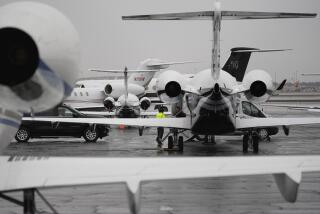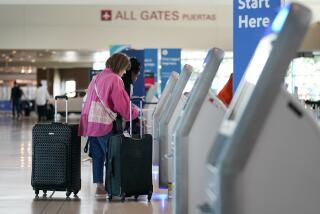Free Market Comes to Airport Slots
WASHINGTON — An experiment in American aviation will begin today that either will open the country’s busiest airports to the free market or turn public landing rights worth millions of dollars over to airlines for nothing.
Under a controversial Transportation Department rule, airlines now will be permitted to buy and sell their valuable landing rights--which they obtained free--at four major airports for whatever price they can get.
Landing rights--also known as slots--are regulated at Washington National, Chicago’s O’Hare and New York’s LaGuardia and Kennedy because these airports are so crowded that they have no room for more flights. The plan could be put into effect at other airports as congestion increases and capacity becomes strained.
‘Buy-Sell’ Rule
The “buy-sell” rule is a windfall for airlines that already have accumulated a great deal of slots at the airports in these extremely profitable markets. At O’Hare, for instance, where each slot could be worth $250,000 or more, the two largest carriers, American and United, control almost 1,000 slots between them--or two-thirds of all the landing rights at the nation’s most congested airport.
“I have a real tough time with the concept,” said Sen. Nancy Landon Kassebaum (R-Kan.), who has introduced legislation to repeal the rule. “There has to be a better way to approach this problem than to give away something that belongs to the people.”
Kassebaum’s bill would force airlines to turn profits from slot leases and sales over to the Federal Aviation Administration to enhance airports. She has said repeatedly that slots are not a property right but instead are a temporary operating privilege.
Her bill sailed through the Senate Commerce Committee and has wide support in the full Senate. Rep. Norman Y. Mineta (D-San Jose), chairman of the House Public Works and Transportation subcommittee on aviation, has said that he, too, opposes the Transportation Department rule and plans to introduce legislation to overrule it.
Until now, slots at the four airports have been allocated by committees of airline executives, but they frequently have found themselves in disagreement. Proponents say this is the only way to open a market that virtually has been closed for years. Now, if a small airline wants to break into business at National Airport, all it has to do is come up with the cash. In the past, not even money would have been enough.
FAA Lottery
“We have been looking for the best, most workable solution to an intractable problem,” James Burnley, assistant secretary of Transportation, told Kassebaum’s Senate aviation subcommittee last month. “This is not a perfect world. If it were, air travel in this country would be unrestrained.”
Because it was feared that the large slot holders would be reluctant to allow new entrants into the market, the FAA held a lottery last week to permit airlines with eight or less slots at each of the four airports to begin service. Many small carriers--including McClain Airlines, which has yet to carry a passenger--received slots that they would have been unlikely to have obtained any other way.
Airlines have been largely silent about their plans to purchase slots, in part because to reveal their desires would make the slots they covet even more valuable. Estimates range from $50,000 up to $1 million for the most highly sought after prime-time slots, but the specter of a bill that could repeal the rule has airlines worried.
“The industry knows that people on Capitol Hill are opposed to this rule,” said Charles Barclay, executive director of the American Assn. of Airport Executives, which opposes the rule. “It is viewed as a flawed regulatory document.”
The Kassebaum bill, in its current form, would not be retroactive; therefore, any transaction before it became law could stand. But some people in the industry fear that Mineta may take a harder line and attempt to turn the clock back on “buy-sell.” Mineta has not yet stated his willingness to do that, but carriers are fully aware that it is possible that they will lose any slot they buy.
“We just can’t really say what is going to happen after Tuesday,” said George James, president of Airline Economics, a Washington firm that follows the industry. “This is something entirely new for the airline industry, and we have no history to draw from. I do think we will see much more turnover than anticipated, and the value of the slots could be much higher than imagined.”
More to Read
Sign up for Essential California
The most important California stories and recommendations in your inbox every morning.
You may occasionally receive promotional content from the Los Angeles Times.










